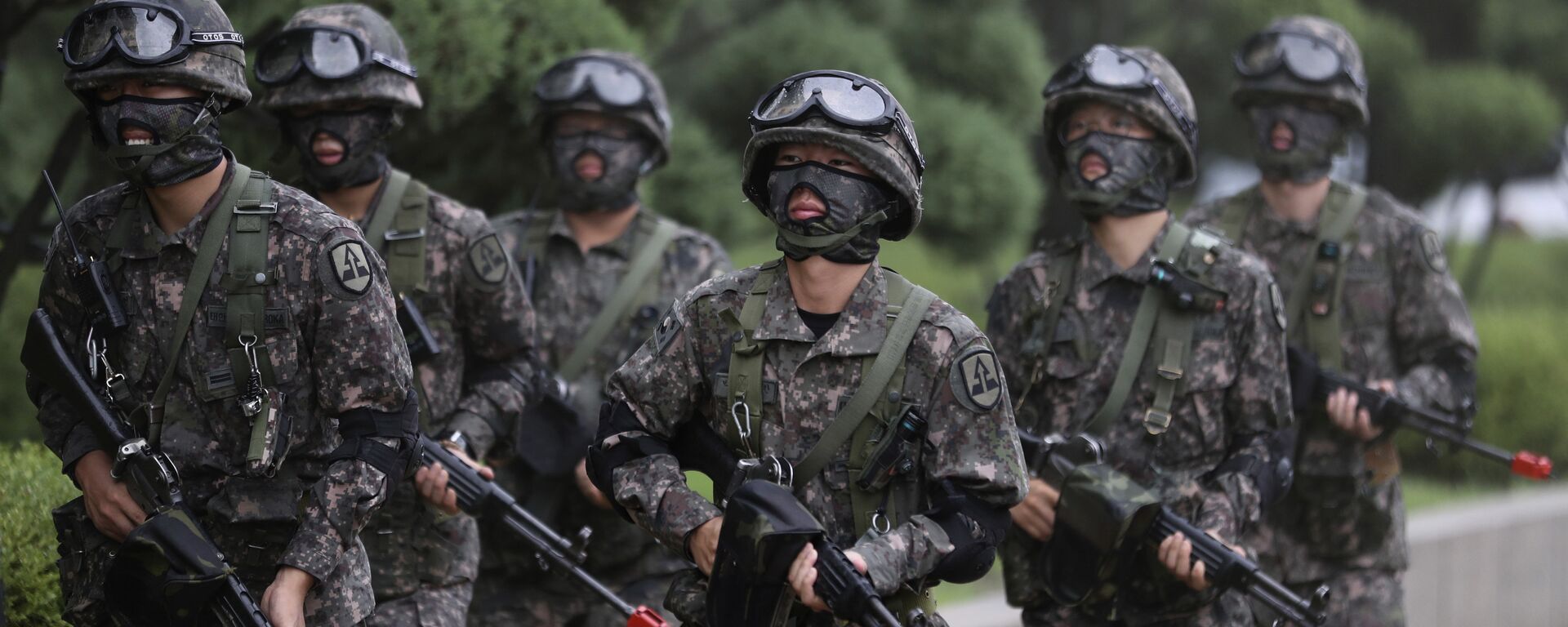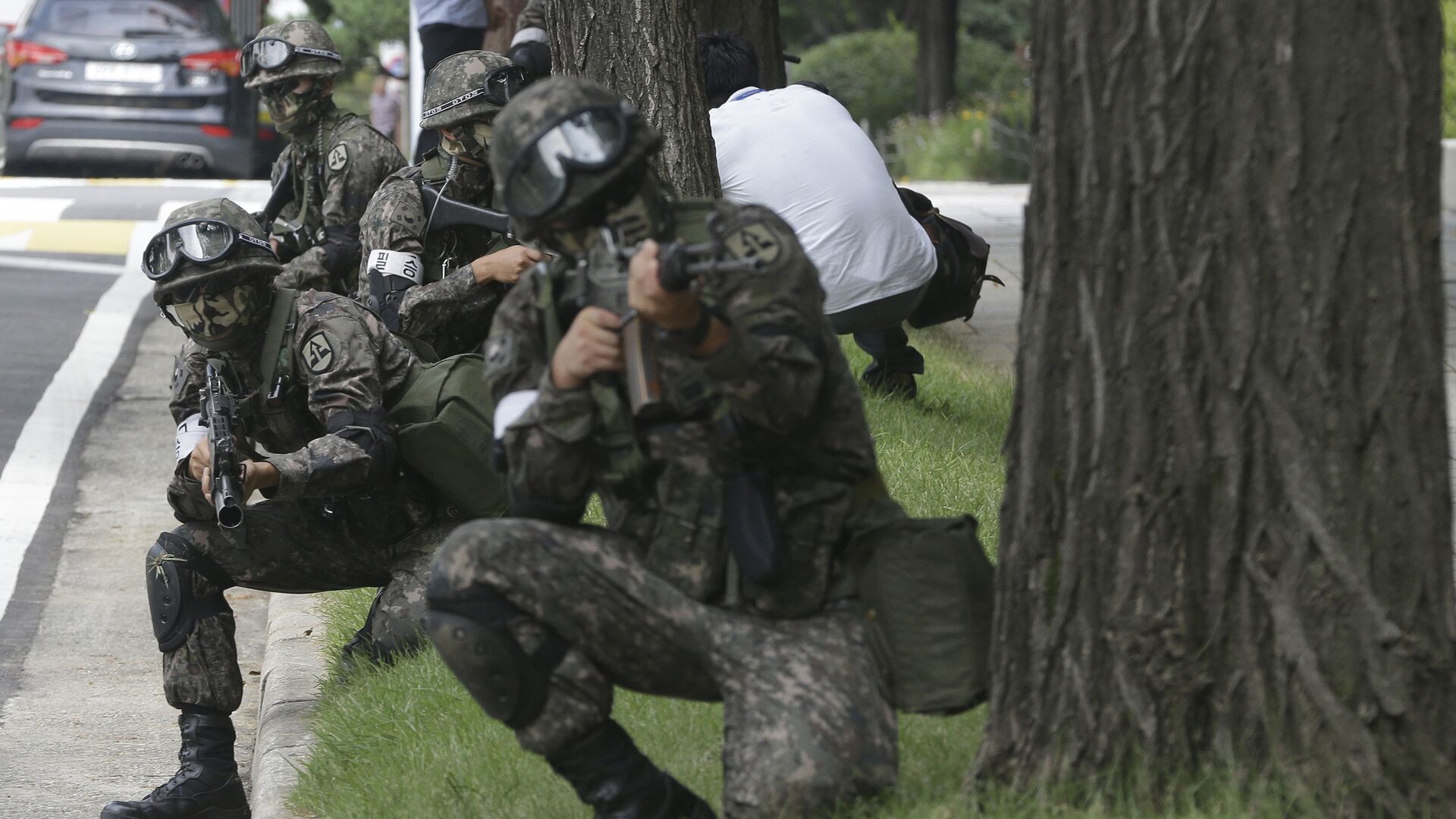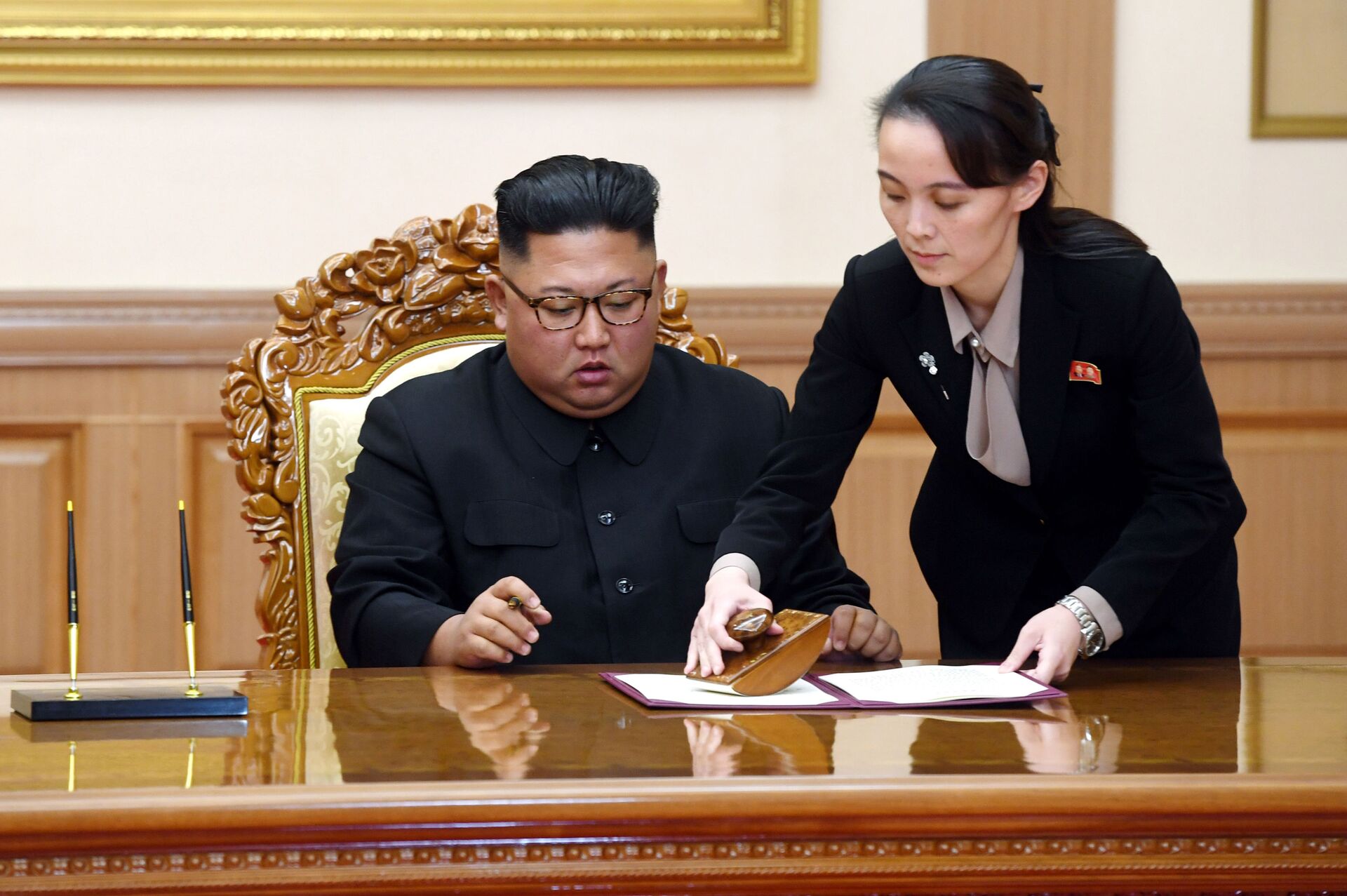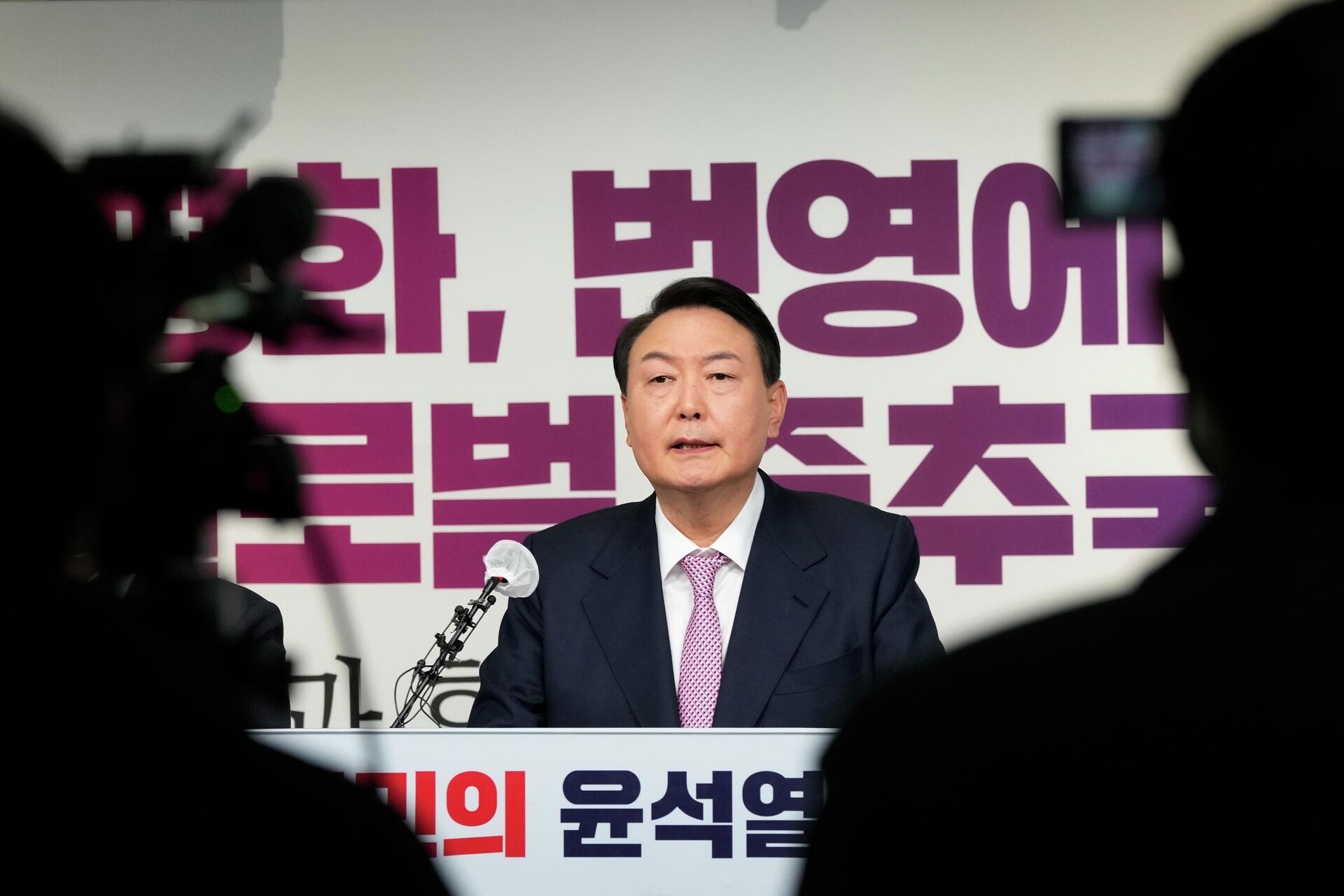https://sputnikglobe.com/20220823/us--south-koreas-militaristic-approach-towards-dprk-pushing-region-to-brink-of-war-scholars-warn-1099909595.html
US & South Korea's Militaristic Approach Towards DPRK Pushing Region to Brink of War, Scholars Warn
US & South Korea's Militaristic Approach Towards DPRK Pushing Region to Brink of War, Scholars Warn
Sputnik International
South Korea and the US on August 22 launched their largest joint military exercises since 2018. The summertime military drills come as South Korean President... 23.08.2022, Sputnik International
2022-08-23T15:37+0000
2022-08-23T15:37+0000
2023-09-18T13:36+0000
us
north korea
opinion
south korea
missile test
preemptive strike
donald trump
analysis
nuclear tests
military drills
https://cdn1.img.sputnikglobe.com/img/105663/74/1056637411_0:340:5001:3153_1920x0_80_0_0_87c28500bd405a41c51e5b8e581ec754.jpg
"The drills reflect a change in the current administration’s North Korea policy," says Dr. Zhang Baohui, director of the Center for Asian Pacific Studies at Lingnan University in Hong Kong. "The new administration leans toward the political right and wants to shift to a strategy of pressure to force North Korea to denuclearize. Restoring bilateral military drills with the US is a way to pressure the North. However, this strategy will certainly backfire by once again creating a situation of mutual mistrust and hostility between the two Koreas."Donald Trump's attempts to facilitate peaceful dialogue between Seoul and Pyongyang were halted under Joe Biden, who made it clear in May 2021 that he would not give DPRK leader Kim Jong-Un "recognition" as "legitimate" head of the state unless he denuclearized the country.Washington's change of heart towards Pyongyang was followed by eight missile tests by the DPRK in 2021. The number of tests conducted by North Korea rose steeply in 2022, as Yoon Suk-yeol won the presidency in South Korea in March 2022, declaring Communist Pyongyang the "main enemy" of Seoul and openly discussing the idea of a preemptive strike against the North.Since Yoon's victory, the Biden administration and their counterparts in Seoul have been focused on "shows of strength and unity with South Korea and what they call a 'calibrated, practical approach,'" according to CNN.Meanwhile, according to US Ambassador to the United Nations Linda Thomas-Greenfield, the DPRK has launched 31 missile tests so far in 2022 and is preparing to conduct a nuclear test. Pyongyang has not conducted atomic tests since September 2017.DPRK's Reaction to Militarist Approach of US & South KoreaGiven this, one could hardly expect a positive dynamic in relations between the South and the North, according to Seung-Whan Choi: "As long as South Korea and the US stick to their militarist approach, there will be no progress toward peace at all, and it will probably push them to the brink of war," he warns.On August 18, Kim Yo Jong, vice department director of the Central Committee of the Workers' Party of Korea (WPK), subjected Yoon to harsh criticism. While the South Korean president vows to "improve the economy and public welfare" in the North once it is denuclearized, he, at the same time, is calling for fighting against Pyongyang's Communist leadership, according to Kim. "To think that the plan to barter 'economic cooperation' for our honor, nukes, is the great dream, hope and plan of Yoon, we came to realize that he is really simple and still childish," Kim said, as quoted by the DPRK's state-run KCNA.Trump's Policy of Engagement WorkedWhile the US mainstream press is branding the recent escalation of tensions between Seoul and Pyongyang as a failure of Donald Trump's policy of engagement, some observers do not share this stance.The Trump policy of engagement was certainly an opportunity for the Americans to interact with and learn about their North Korean counterparts on an interpersonal basis, according to Michael Madden, nonresident fellow at the Stimson Center, leading contributing analyst to 38 North, and director and founder of NK Leadership Watch.According to the scholar, "the interactions among Kim, Trump and Moon opened up some basic, technical communications channels." He emphasizes that direct leadership interactions on the part of the US are helpful and highly effective, even in the event that an agreement is not reached."The change in political leadership kind of washed away any substantive accomplishments - even PR/publicity accomplishments," Madden admitted. "So there are some minimal, albeit inconsistent, interactions between staff-level individuals of these countries. I suspect a 50/50 chance of someone answering the telephone is preferable to a 0 chance they answer the telephone."Under these circumstances the risk of "miscalculation" is increasing dramatically, according to the US scholar. He warns that "one or both sides could misunderstand the others and that could trigger a chain of slipshod or ill-informed decision making."
https://sputnikglobe.com/20220822/us-south-korea-kickstart-biggest-military-drills-since-2018-amid-criticism-from-pyongyang-1099839425.html
north korea
south korea
Sputnik International
feedback@sputniknews.com
+74956456601
MIA „Rossiya Segodnya“
2022
News
en_EN
Sputnik International
feedback@sputniknews.com
+74956456601
MIA „Rossiya Segodnya“
Sputnik International
feedback@sputniknews.com
+74956456601
MIA „Rossiya Segodnya“
us, north korea, opinion, south korea, missile test, preemptive strike, donald trump, nuclear tests, military drills
us, north korea, opinion, south korea, missile test, preemptive strike, donald trump, nuclear tests, military drills
US & South Korea's Militaristic Approach Towards DPRK Pushing Region to Brink of War, Scholars Warn
15:37 GMT 23.08.2022 (Updated: 13:36 GMT 18.09.2023) South Korea and the US on August 22 launched their largest joint military exercises since 2018. The summertime military drills come as South Korean President Yoon Suk-yeol pledged to boost deterrence against the Democratic People's Republic of Korea (DPRK). Seoul also launched the four-day Ulchi civil defense drills on Monday.
"The drills reflect a change in the current administration’s North Korea policy," says Dr. Zhang Baohui, director of the Center for Asian Pacific Studies at Lingnan University in Hong Kong. "The new administration leans toward the political right and wants to shift to a strategy of pressure to force North Korea to denuclearize. Restoring bilateral military drills with the US is a way to pressure the North. However, this strategy will certainly backfire by once again creating a situation of mutual mistrust and hostility between the two Koreas."
Donald Trump's attempts to facilitate peaceful dialogue between Seoul and Pyongyang were halted under Joe Biden, who made it clear in May 2021 that he would not give DPRK leader Kim Jong-Un "recognition" as "legitimate" head of the state unless he denuclearized the country.
Washington's change of heart towards Pyongyang was followed by eight missile tests by the DPRK in 2021. The number of tests conducted by North Korea rose steeply in 2022, as Yoon Suk-yeol won the presidency in South Korea in March 2022, declaring Communist Pyongyang the "main enemy" of Seoul and openly discussing
the idea of a preemptive strike against the North.
Since Yoon's victory, the Biden administration and their counterparts in Seoul have been focused on "shows of strength and unity with South Korea and what they call a 'calibrated, practical approach,'"
according to CNN.
Meanwhile,
according to US Ambassador to the United Nations Linda Thomas-Greenfield, the DPRK has launched 31 missile tests so far in 2022 and is preparing to conduct a nuclear test. Pyongyang has not conducted atomic tests since September 2017.

22 August 2022, 07:10 GMT
DPRK's Reaction to Militarist Approach of US & South Korea
"As long as South Korea and the US take a militaristic approach, Pyongyang will not back down," explains Professor Seung-Whan Choi, who teaches International Relations and Korean politics at the University of Illinois at Chicago. "As soon as the joint drills are over, North Korea will either fire a few missiles or probably conduct its seventh nuclear test. With the shift of power from the progressive president, Moon, to the conservative president, Yoon, the show of force was expected. Yoon will continue to play hardball with North Korea."
Given this, one could hardly expect a positive dynamic in relations between the South and the North, according to Seung-Whan Choi: "As long as South Korea and the US stick to their militarist approach, there will be no progress toward peace at all, and it will probably push them to the brink of war," he warns.
On August 18, Kim Yo Jong, vice department director of the Central Committee of the Workers' Party of Korea (WPK), subjected Yoon to harsh criticism. While the South Korean president vows to "improve the economy and public welfare" in the North once it is denuclearized, he, at the same time, is calling for fighting against Pyongyang's Communist leadership, according to Kim.
"To think that
the plan to barter 'economic cooperation' for our honor, nukes, is the great dream, hope and plan of Yoon, we came to realize that he is really simple and still childish," Kim said, as
quoted by the DPRK's state-run KCNA.
"Probably, the biggest problem is Yoon’s lack of knowledge and experiences of foreign policy," suggests Seung-Whan Choi. "Yoon doesn’t understand at all why and how the balance of power on the Korean Peninsula is maintained to save his own people and properties. Well, since Yoon cares more about saving his power and his wife than his country, I guess that it doesn’t matter to him. Yoon thinks that as long as he can beat up Kim Jong-un, he will be victorious. What Yoon doesn’t understand is that beating up Kim has lots of negative consequences, including the break of the balance of power, and it might be the end of the two Koreas together."
Trump's Policy of Engagement Worked
While the US mainstream press is branding the recent escalation of tensions between Seoul and Pyongyang as a failure of Donald Trump's policy of engagement, some observers do not share this stance.
"Trump-era policy of engagement has not actually failed," observes Dr. Victor Teo, political scientist specializing in international relations of Asia Pacific and a North Korea expert. "Since the meetings between Kim and Trump, North Korea toned down its military activities and have had relatively cordial relations with both the ROK and the US. The developments we see today are a result of a change in the political posture in the US and ROK due to electoral victories of Biden and Yoon. These new leaders and their respective parties do not consider the policies of their predecessors (Trump’s and Moon’s) to be beneficial to their countries, and to the alliance. There is therefore a need to prioritize alliance politics before anything else, including building a workable relationship with the DPRK."
The Trump policy of engagement was certainly an opportunity for the Americans to interact with and learn about their North Korean counterparts on an interpersonal basis, according to Michael Madden, nonresident fellow at the Stimson Center, leading contributing analyst to 38 North, and director and founder of NK Leadership Watch.
According to the scholar, "the interactions among Kim, Trump and Moon opened up some basic, technical communications channels." He emphasizes that direct leadership interactions on the part of the US are helpful and highly effective, even in the event that an agreement is not reached.
"The change in political leadership kind of washed away any substantive accomplishments - even PR/publicity accomplishments," Madden admitted. "So there are some minimal, albeit inconsistent, interactions between staff-level individuals of these countries. I suspect a 50/50 chance of someone answering the telephone is preferable to a 0 chance they answer the telephone."
Under these circumstances the risk of "miscalculation" is increasing dramatically, according to the US scholar. He warns that "one or both sides could misunderstand the others and that could trigger a chain of slipshod or ill-informed decision making."
"Once we move out of the joint exercise space of the summer (and of course there will be other exercises down the road) we will need to see what strategic decisions are undertaken in Seoul and Pyongyang," he says. "Some of these knotty issues on the Peninsula could certainly affect overall geopolitical relationships and alliances."





